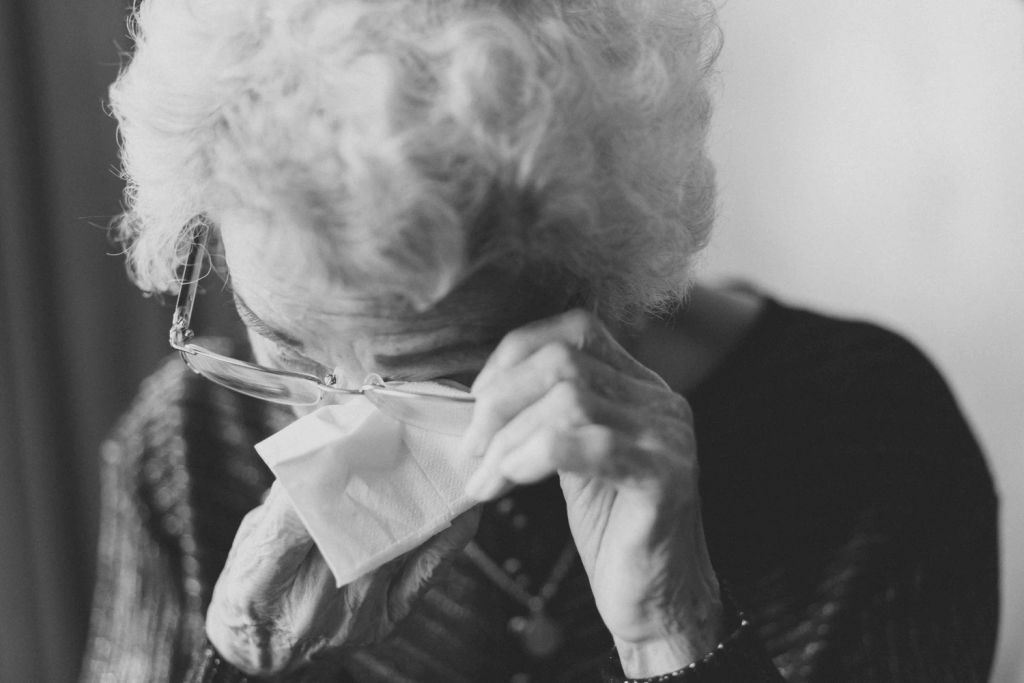Help a Senior Say Goodbye to Their Partner
August 2, 2019
Photo credit: Unsplash
When an older adult loses the love of their life, it can make them feel like their entire world is falling apart. If you have a senior in your life who is dealing with the death of their partner, you can help ease their burden by providing help with an essential, yet difficult, task: planning the funeral for their spouse. Pulling together a memorial can take a lot of work and mental clarity, so it can be helpful for seniors to have someone a little more focused by their side during this ordeal. Here are six elements to think about when helping a senior plan a funeral for their partner.
Look at Finances
You may be surprised to learn the the true costs of funerals and burial services, and all of the tiny details your loved one will need to consider. A traditional burial involves a list of decisions and expenses, such as caskets, vaults and flowers. Even cremation can prove quite costly. Go over these items together and think about what fits into the available budget. Factor in life insurance, if the deceased had coverage, but try to remain practical when making these decisions. It may be easier for the widow or widower to make sound financial decisions with you there to help them along the way.
Plan Out the Ceremony
Talk to your loved one about their expectations for the memorial service, as well as any last wishes of their lost partner. You may need to help with tasks like finding a musician or a religious representative for the funeral, but funeral directors can often help point you in the right direction. If you’re helping plan services for a veteran, ask their partner about including military services, and contact your local AMVETS about these special arrangements.
Figure Out Food
People tend to gather after the ceremony, and often, these gatherings involve some sort of food and refreshments. Select a home or location the spouse is comfortable with and arrange to have any offerings prepared ahead of time. Get together with friends, and plan a potluck or look into economic options for catering. You can even ask guests to bring along a simple dish or some nourishing meals. When people grieve, they often are in no condition to cook, so any leftovers or even setting up a meal train will be helpful to the widow or widower during and after the funeral.
Manage the Home and Responsibilities
Planning a funeral can be exhausting and draining. You can help out by tidying up the widow’s home and taking care of tasks in their life. Help them clean up their house and complete basic tasks, like laundry or watering plants. If they have pets, think about hiring a dog walker or boarding their dog to give them one less thing to worry about. Helping your loved one take care of their home will take a lot of stress off of them during this difficult time.
Prepare for the Day of The Funeral
No matter how well you plan, the day you have to say goodbye will be challenging. Let seniors express themselves and their pain, and be prepared to provide them with comfort and support. Put together a kit of helpful supplies to keep on hand, like tissues, water and pain relievers. You can also help by directing funeral attendees around the service and letting them know about post-service gatherings or ways they can help in the days to come. Above all, be prepared to just be there for your loved one as they process and proceed with what will be one of the hardest days of their life.
What Not to Do
Because the senior lost their partner, they are likely living alone now, which may be concerning to you if they’re very old or their health is declining. However, now is not the time to voice your concerns. Your loved one has enough on their mind, and shouldn’t have to have hard conversations surrounding their ongoing care or whether they should stay in their home. Unless there is immediate cause for concern, wait at least a few months for these types of discussions when their grief isn’t so raw.
Talk to your loved one about their expectations for the memorial service, as well as any last wishes of their lost partner. You may need to help with tasks like finding a musician or a religious representative for the funeral, but funeral directors can often help point you in the right direction. If you’re helping plan services for a veteran, ask their partner about including military services, and contact your local AMVETS about these special arrangements.
Figure Out Food
People tend to gather after the ceremony, and often, these gatherings involve some sort of food and refreshments. Select a home or location the spouse is comfortable with and arrange to have any offerings prepared ahead of time. Get together with friends, and plan a potluck or look into economic options for catering. You can even ask guests to bring along a simple dish or some nourishing meals. When people grieve, they often are in no condition to cook, so any leftovers or even setting up a meal train will be helpful to the widow or widower during and after the funeral.
Manage the Home and Responsibilities
Planning a funeral can be exhausting and draining. You can help out by tidying up the widow’s home and taking care of tasks in their life. Help them clean up their house and complete basic tasks, like laundry or watering plants. If they have pets, think about hiring a dog walker or boarding their dog to give them one less thing to worry about. Helping your loved one take care of their home will take a lot of stress off of them during this difficult time.
Prepare for the Day of The Funeral
No matter how well you plan, the day you have to say goodbye will be challenging. Let seniors express themselves and their pain, and be prepared to provide them with comfort and support. Put together a kit of helpful supplies to keep on hand, like tissues, water and pain relievers. You can also help by directing funeral attendees around the service and letting them know about post-service gatherings or ways they can help in the days to come. Above all, be prepared to just be there for your loved one as they process and proceed with what will be one of the hardest days of their life.
What Not to Do
Because the senior lost their partner, they are likely living alone now, which may be concerning to you if they’re very old or their health is declining. However, now is not the time to voice your concerns. Your loved one has enough on their mind, and shouldn’t have to have hard conversations surrounding their ongoing care or whether they should stay in their home. Unless there is immediate cause for concern, wait at least a few months for these types of discussions when their grief isn’t so raw.
Dealing with the death of a loved one is never easy. Planning a funeral during this tough time can be especially overwhelming for a senior who has lost a life partner. You can help relieve some of the strain by helping them plan, prepare for and carry out the memorial services for their loved one. Helping a loved one in need is such a lovely way to show compassion when it’s needed the most.
